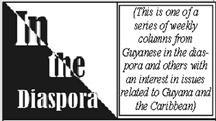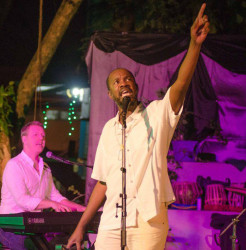By David McAlmont
(David McAlmont is a recording artiste, writer and historian living in London. His collaborations in London have included David Arnold, Bernard Butler, Michael Nyman, Courtney Pine and Guy Davies with whom he has formed the duo Fingersnap; they visited Guyana this month to perform at the G-Jazz Festival at Georgetown’s Theatre Guild. David’s mother is Guyanese. He resided in Berbice, Wismar, Grove, Craig and Georgetown between 1978 and 1987.)
“But David you just disappeared!” Sean Bhola (a giant talent back then whom I sang and performed with at church) to me in the grounds of the Theatre Guild in the Kingston borough of Georgetown, Guyana.

Yesterday, an old school friend took me to the Pegasus, the city’s once unrivalled top hotel. It has competition now in the guise of a controversial new Marriott hotel: the word on the street is that tax dollars were poured into its foundations. My friend reiterates what a few people have said: the country haemorrhaged its middle class! It was Sean who first couched the situation in those terms to me. He was explaining the absence of pianos—yes, really, and the non-existence of a thriving local musical scene. So much of Guyana’s talent, skills set, arts, and colloquial culture—currently challenged by Jamaican colloquialisms attached to the popularity of dancehall music—just left. In place of those qualities the prevalent evidence of prosperity has largely been corrupt or criminal. The young are being beguiled by the wrong type of success; their aspirations to education or office are bedeviled by the allure of gold or crime. Yet there is a new optimism afoot. The Guyanese have elected a new coalition. The optimism is cautious, but it is optimism all the same. There are whispers of a new middle class; some of “them” are coming back.

To me, Georgetown felt like the centre of all things back then; I would not have wanted to live anywhere else in Guyana. Today, in a meeting with the Minister for Tourism, I have a moment of devastated epiphany. I state that Guyana made me. That when I returned to England I had an education that my cousins couldn’t believe. I was a beneficiary of huge musical encouragement and mentorship, from school, church and other musicians. For years I have thought that people like me, who were “asleep” in British schools, should go to Guyana for an education. If what I have been told about the state of things is true, I have been mistaken for decades. It is truly upsetting. I am crushed to hear that the opportunities that were once available to me here have somehow subsided. I’m grateful for my success, but saddened at the idea of true stars languishing here. I am one who needs to come back more frequently.
Don’t get me wrong. It is not remotely a backward place. While twenty-eight years in London—all that concrete, those skyscrapers, the civic responsibility, the public transport infrastructure—might make Georgetown feel almost rural in comparison, like a sprawling tropical country town, it seems much busier now, many more people. There is contemporary modernity in evidence. There are Internet cafes. One of the musicians we’ve been hanging out with at the G-Jazz Fest, Courtney Fadlin, says that months ago the whole city was filthy, but it is getting cleaned up. Still, there are massive Sunday night gatherings and cookouts at the severely littered sea wall—Georgetown is below sea level, which is why it was handy that the Dutch were here before the English.
They still play music as loudly as they ever did. It is as hilarious as it is outrageous. You don’t always know where it’s coming from, it bounces and ricochets off buildings. There is Dynasty at Roxanne Burnham gardens, open-air ballroom dancing. Many Guyanese, so many of them drop dead beautiful – eye-poppingly so, are always resplendently attired. Christmas is still a massive deal here. The decorations are hilarious. Last night we were shown a funeral parlour, Coffins Are Us, that was festive beyond any idea of solemnity.
It was uproarious and endearing. It surprises me that people are partying until 02:00hrs on a Sunday night (in religious Guyana?) but another growing trend, even with my generation, is an impatience with an old style of draconian religious fervour.
There are many more cars now. There are air conditioned restaurants and hotels. Men still “tow,” for example, which is to say, their loved ones become passengers affixed to their pushbike’s anatomy. Back then, the most extraordinary form of this action I ever saw was one torrentially rainy morning as I proceeded through Meadow Brook Gardens: a father riding, his wife positioned on his bicycle frame, cradling their child while holding an umbrella, another sodden child strapped to the pushbike’s rack. Today I see a father with a 1930s German storm trooper style helmet—this type of helmet is ubiquitous in the Georgetown streets—a barely clad toddler betwixt his thighs, helmetless, speeding along Laluni Street.
A thrilling re-acquaintance is the parasol factor. In Guyana, men and women protect themselves from the solar burn beneath umbrellas functioning as parasols. Especially when they step out in three-piece suits to go to church—I’m not kidding. The sun is not argued with. It is relentless. It burns. It is a joy to see the umbrellas aloft. It’s something I used to do.
There are other habits I developed here that have foundered in the UK. When you shake British hands most people quickly repulse your grip. In Guyana it is not uncommon to hold a hand for ages after you’ve shaken it. When somebody makes you laugh or, “give you joke,” as the Guyanese say, it is quite common to put your hand on his or her arm, back, shoulder and laugh. I’ve done this in London sometimes only to have people flinch.
When people laugh they sometimes cover their mouths. Over time I have wondered why I do this and questioned the action. It’s a Guyanese “ting.”
I’m tearful today. I’m not sad. My heart is full. Last night was one of the most emotional evenings of my life. There was rum; there were tears and karaoke. At one of our recent performances here I remarked upon a musical trend in eighties Georgetown. International acts didn’t come here. Local singers became the country’s Stevie Wonder or its Luther Vandross, and so on. I explained that my problem was that I preferred girl singers then, so I could hardly expect Guyana to allow me to be its Whitney Houston.
At least the remark got a laugh—times are changing. At the karaoke bar that Sean found, a lovely little establishment with white walls, flamboyant red and white seasonal curtains swathed in electric blue lighting, Sean asked me what I was going to sing. I thought about it and decided to do Whitney. He looked at me with a wide-eyed smirk and said, “For real?” My response? “Oh hell yes!”
The microphone is cordless. You can sing outside if you know the words and inside if you don’t. There are some great singers here. There are also some car crashes. We do our best to maintain our courtesy as a lovely, but less than gifted barmaid massacres Whitney’s “The Greatest Love of All”; in the end the laughter cannot be suppressed. The misfires are so remarkable that it seems almost skilful. I feel bad singing a Whitney song after this woman. It feels as if I am demonstrating how Whitney should be sung.
It’s my turn. The introduction plays. It is the original key. I can do this. I launch into it, my eyes closed in intense concentration, sweat oozing from my forehead. As the high notes approach I go for them and reach them. At last! I become the Guyana Whitney.
It is such a moment. Sean and Guy are clapping and screaming. Others in the bar, when I open my eyes, are looking at me in disbelief. Guy says that they are looking for the tits. Sean says they are thinking, “Oh my god! Is a man dat?” Is that a man? Then Sean rises majestically, as he always did, to sing “I Believe”. The power of yesteryear is still there, good and strong.
He is such a statuesque man, a real presence. The powerful, Pentecostal teen tenor is still very much alive with additional baritone gravitas. Then we perform Stevie Wonder’s “Lately” and Neil Diamond’s “Love on the Rocks” together. We harmonise. We sing to each other. We smile. Choke back a tear or two. I don’t think I have been happier this year.
There are friends you meet after a few months or years, and simply carry on where you left off.
There are those who you meet after a few decades. Sean Bhola—my Christian Soul brother from back in the day—and I found each other anew on Friday. We have been talking and talking and talking. So much to say; so many years to cover. Too short a trip; too short a life.





